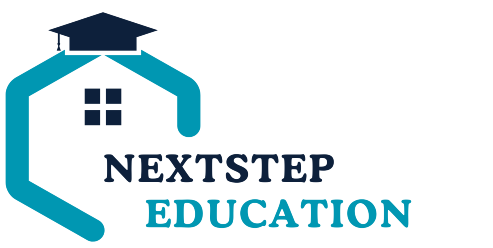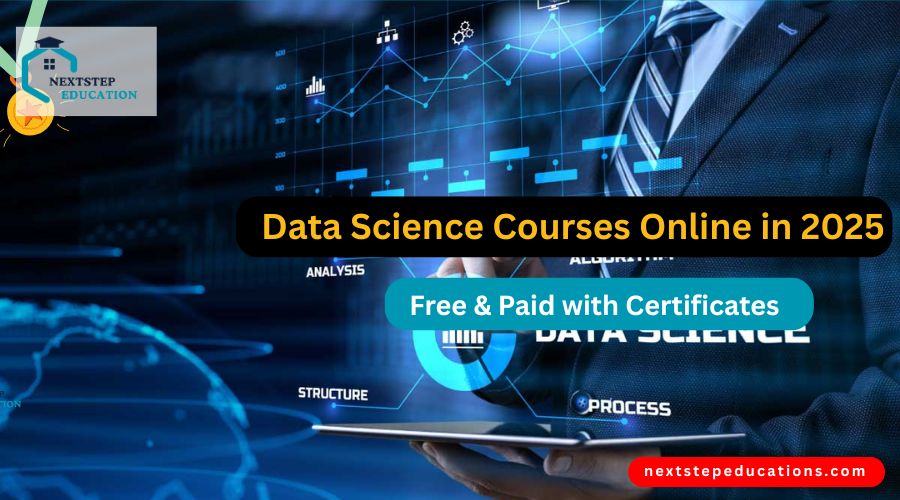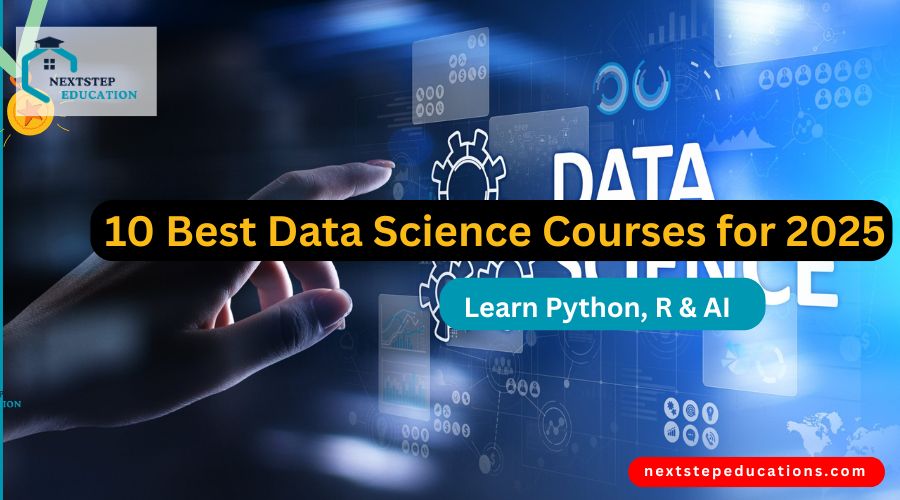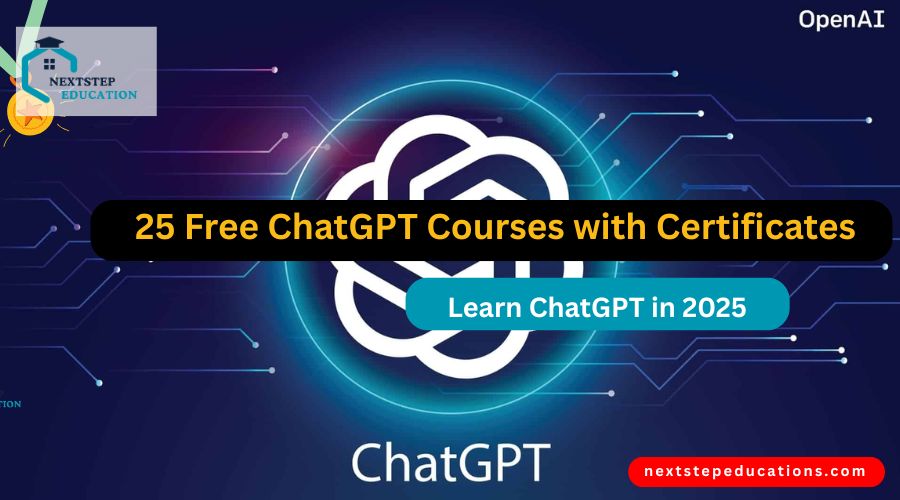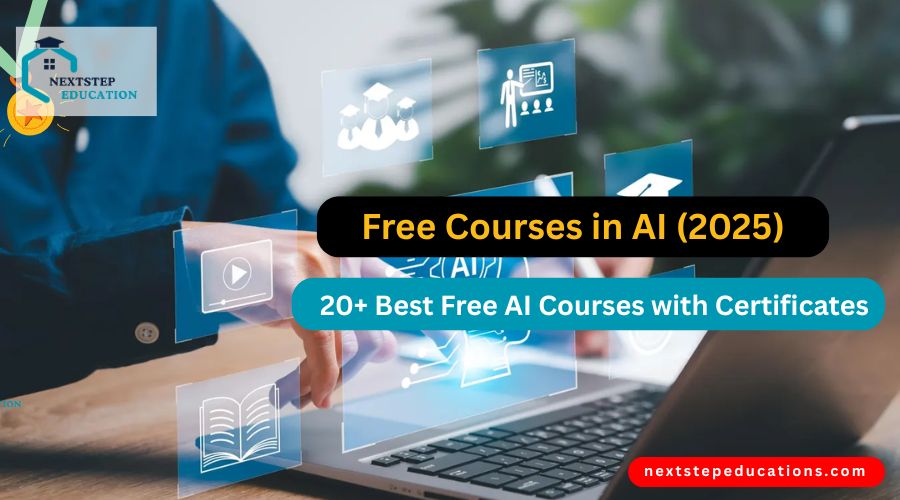Data Science has become one of the most in-demand career paths of the 21st century. With industries relying on big data, machine learning, and AI, the demand for skilled data scientists is growing at an exponential rate. Whether you’re a beginner exploring the basics of Python or a professional aiming to transition into advanced AI and deep learning, the right data science course can shape your career.
In this blog, we’ve compiled a list of the 15 best data science courses online in 2025. These programs—from platforms like Coursera, Udemy, edX, DataCamp, Fast.ai, Udacity, LinkedIn Learning, and Kaggle—cover everything from Python, R, and data visualization to machine learning, deep learning, and AI applications. Some are free, while others are paid with certificates that hold strong industry recognition.
If you’re searching for the best online data science courses with certification, this guide will help you find the right one for your career goals.
Why Learn Data Science in 2025?
The global reliance on data is stronger than ever before. According to reports, the data science industry is projected to reach $378 billion by 2030, with a huge surge in demand for data analysts, machine learning engineers, and AI specialists.
Some reasons why learning data science in 2025 is a career-defining move:
-
High demand & job opportunities: From tech giants to startups, companies are hiring skilled data scientists worldwide.
-
Lucrative salaries: Average salaries for data scientists are significantly higher compared to other IT roles.
-
Diverse applications: Data science is used in healthcare, finance, e-commerce, cybersecurity, sports, and even entertainment.
-
Integration with AI: With AI booming, data science skills (Python, ML, neural networks) are essential for future-proof careers.
Whether you want to become a data analyst, data engineer, or AI researcher, building strong foundations in data science will unlock multiple career paths.
How to Choose the Right Data Science Course?
With so many options available, selecting the right data science certification course can be overwhelming. Here are some key factors to consider before enrolling:
-
Level of Expertise: If you’re a beginner, start with introductory courses. Advanced learners can opt for machine learning or deep learning programs.
-
Free vs Paid: Free courses (like Kaggle or Fast.ai) are excellent for exploration, while paid certifications (Coursera, Udacity, DataCamp) boost credibility.
-
Programming Language Focus: Decide whether you want to learn with Python, R, or both, as different courses emphasize different languages.
-
Duration & Flexibility: Some programs are just 6–8 hours long, while others take months. Choose based on your learning pace and availability.
-
Career Goals: If you’re looking for a job transition, pick courses that offer projects and certification. If you’re just learning for fun, short free courses may be enough.
15 Best Data Science Courses Online in 2025
1. Data Science Specialization by Johns Hopkins University
-
Platform: Coursera
-
Duration: ~11 months (if part-time)
This specialization is one of the most popular data science courses on Coursera. It provides a comprehensive foundation in data science, including R programming, statistical inference, regression models, and machine learning. The program also includes a final capstone project where learners apply their knowledge to solve a real-world problem.
Best For: Beginners to intermediate learners who want an academic, structured approach to data science.
Why Recommended:
-
Covers end-to-end data science workflow.
-
Offered by Johns Hopkins University, a globally reputed institution.
-
Includes practical projects that can be added to your portfolio.
2. Complete Machine Learning A-Z™ with Python & R
-
Platform: Udemy
-
Duration: ~22 hours of content
Overview:
This best-selling Udemy course focuses on machine learning algorithms and real-world implementation. It teaches supervised and unsupervised learning, natural language processing (NLP), reinforcement learning, and deep learning, using both Python and R.
Best For: Students and professionals who want a hands-on, project-based course to quickly build practical ML skills.
Why Recommended:
-
Includes practical coding exercises and downloadable templates.
-
Uses both Python and R, making it versatile.
-
Affordable compared to university-led programs.
3. Data Science and Machine Learning Essentials by Microsoft
-
Platform: edX
-
Duration: ~2-3 months (self-paced)
Overview:
This Microsoft-designed course introduces learners to data exploration, visualization, feature engineering, and machine learning techniques. It uses both R and Python to build a strong foundation for aspiring data scientists.
Best For: Beginners who want a structured entry point into data science, especially those interested in Microsoft’s ecosystem.
Why Recommended:
-
Developed by Microsoft experts.
-
Focus on core data science techniques.
-
A great bridge for learners planning to move toward Azure AI/ML certifications.
4. Deep Learning Specialization by Andrew Ng
-
Platform: Coursera
-
Duration: ~3 months (if part-time)
Overview:
Taught by Andrew Ng, one of the most influential names in AI, this specialization dives deep into neural networks, deep learning, and advanced machine learning techniques. It covers backpropagation, CNNs, RNNs, LSTMs, and more using TensorFlow and Keras.
Best For: Learners with a basic understanding of Python and machine learning who want to specialize in deep learning and AI.
Why Recommended:
-
Designed by Andrew Ng and DeepLearning.AI.
-
Provides a solid foundation for careers in AI, NLP, and computer vision.
-
Includes real-world coding assignments and projects.
5. Data Scientist Nanodegree by Udacity
-
Platform: Udacity
-
Duration: 4–6 months (self-paced)
Overview:
The Udacity Data Scientist Nanodegree is one of the most career-focused programs. It covers data wrangling, visualization, machine learning, and deep learning. Students also get access to mentorship, career services, and real-world projects designed in collaboration with top tech companies.
Best For: Job seekers and professionals who want to pursue a career in data science and need practical, portfolio-ready projects.
Why Recommended:
-
Includes hands-on industry projects.
-
Provides career support and mentorship.
-
Recognized globally as a professional certification.
6. Data Scientist with Python Career Track
-
Platform: DataCamp
-
Duration: ~12 months (if part-time)
Overview:
This career track offers a step-by-step Python learning path for aspiring data scientists. It includes Python basics, data manipulation with pandas, data visualization, machine learning, and statistical analysis. Learners get to work on hands-on projects and coding challenges.
Best For: Beginners and intermediate learners who want a long-term, structured program to master data science with Python.
Why Recommended:
-
Covers over 20 courses in one track.
-
Focuses heavily on Python, the most in-demand skill for data science.
-
Provides real-world projects and interactive coding practice.
7. Applied Data Science with Python Specialization by University of Michigan
-
Platform: Coursera
-
Duration: ~5 months (if part-time)
This specialization focuses on applying Python to real-world data science tasks. Learners explore data visualization, machine learning, text analysis, and social network analysis using Python libraries such as pandas, matplotlib, scikit-learn, and nltk.
Best For: Intermediate learners who want to use Python for practical data analysis and machine learning.
Why Recommended:
-
Includes hands-on projects and case studies.
-
Taught by the University of Michigan, a reputable academic institution.
-
Strong emphasis on Python for data science and real-world applications.
8. Practical Deep Learning for Coders
-
Platform: Fast.ai
-
Duration: ~7 weeks (if part-time)
Overview:
Fast.ai’s course is a hands-on deep learning program aimed at developers who want to learn by building real models. It covers neural networks, computer vision, natural language processing, and practical implementations using PyTorch.
Best For: Coders and developers who want to quickly get practical experience in deep learning without heavy theory.
Why Recommended:
-
Focuses on practical applications over theory.
-
Covers cutting-edge techniques in AI, computer vision, and NLP.
-
Free and open-source, making it accessible to all learners.
9. Intro to Machine Learning
-
Platform: Kaggle (Free)
-
Duration: ~6–8 hours
Overview:
Kaggle’s free course introduces learners to machine learning fundamentals through practical exercises and projects. Topics include supervised learning, model evaluation, and basic algorithms.
Best For: Beginners who want a quick start with hands-on machine learning using Python.
Why Recommended:
-
Completely free with interactive notebooks for coding practice.
-
Excellent starting point for learners exploring ML before committing to longer courses.
-
Offers exposure to real datasets and Kaggle competitions.
10. Intro to Data Analysis
-
Platform: Udacity
-
Duration: ~2 months (self-paced)
Overview:
Udacity’s Intro to Data Analysis course focuses on data wrangling, exploration, and visualization using Python and real-world datasets. Learners practice cleaning data, performing exploratory analysis, and presenting insights effectively.
Best For: Beginners who want a strong foundation in Python and data analysis techniques.
Why Recommended:
-
Provides practical exercises with real datasets.
-
Covers essential data analysis skills for entry-level roles.
-
Prepares learners for more advanced data science and machine learning courses.
11. Machine Learning Scientist with R Career Track
-
Platform: DataCamp
-
Duration: ~6–12 months (if part-time)
This comprehensive track teaches machine learning using R, including supervised and unsupervised learning, model evaluation, and data visualization. It’s ideal for learners who prefer R over Python.
Best For: Learners who want a structured R-based machine learning path and a career in data science.
Why Recommended:
-
Covers complete ML workflow using R.
-
Includes hands-on coding challenges and projects.
-
Suitable for beginners and intermediate learners focusing on statistical analysis and predictive modeling.
12. AI For Everyone by Andrew Ng
-
Platform: Coursera
-
Duration: 4 weeks (self-paced)
This non-technical course is perfect for understanding how AI impacts industries and business processes. It introduces concepts like AI terminology, workflows, and project management, without requiring programming experience.
Best For: Professionals, managers, and beginners who want a high-level understanding of AI applications.
Why Recommended:
-
Taught by Andrew Ng, a leading AI expert.
-
Focuses on practical AI knowledge for decision-makers.
-
Ideal for learners who want to understand AI’s role in business before diving into technical courses.
13. Learning Data Science: Tell Stories With Data
-
Platform: LinkedIn Learning
-
Duration: ~2 hours
This short, focused course emphasizes data storytelling and visualization techniques. Learners explore how to communicate insights effectively using charts, dashboards, and narrative techniques, making complex data accessible to stakeholders.
Best For: Professionals and beginners who want to enhance their data visualization and storytelling skills.
Why Recommended:
-
Quick and concise, perfect for busy learners.
-
Focuses on the critical skill of presenting data insights.
-
Complements technical data science courses with soft skills for business impact.
14. Data Science and Machine Learning Bootcamp with R
-
Platform: Coursera
-
Duration: ~25 hours of content
This bootcamp teaches data science, machine learning, and visualization using R. Learners gain hands-on experience with predictive modeling, regression, clustering, and statistical analysis.
Best For: Beginners and intermediate learners looking for a practical, R-focused data science course.
Why Recommended:
-
Combines data science fundamentals and practical R coding.
-
Projects and exercises ensure real-world application.
-
Ideal for students who prefer R over Python for analytics.
15. Python for Data Science and Machine Learning Bootcamp
-
Platform: Udemy
-
Duration: ~25 hours of content
Overview:
This comprehensive course teaches Python for data analysis, visualization, and machine learning. Topics include NumPy, pandas, Matplotlib, Seaborn, Scikit-learn, and TensorFlow, with practical exercises throughout.
Best For: Beginners and intermediate learners who want a complete Python-based data science and ML program.
Why Recommended:
-
Hands-on projects and exercises make it practical and application-focused.
-
Covers Python libraries used widely in data science and AI.
-
Ideal for learners building a portfolio for jobs or freelancing.
Comparison Table: 15 Best Data Science Courses Online
| Course Name | Platform | Duration | Focus / Highlights | Best For | Certificate |
|---|---|---|---|---|---|
| Data Science Specialization | Coursera | ~11 months | R programming, ML, data visualization, capstone project | Beginners & Intermediate | Yes |
| Complete Machine Learning A-Z™ | Udemy | ~22 hours | Python & R, supervised & unsupervised learning, projects | Beginners & Professionals | Yes |
| Data Science & ML Essentials | Microsoft / edX | ~2–3 months | Data analysis, ML techniques, Azure ML Studio | Beginners | Yes |
| Deep Learning Specialization | Coursera | ~3 months | Neural networks, TensorFlow, Keras, CNNs, RNNs | Intermediate & AI-focused | Yes |
| Data Scientist Nanodegree | Udacity | 4–6 months | Data wrangling, ML, deep learning, real-world projects | Job seekers & Professionals | Yes |
| Data Scientist with Python Career Track | DataCamp | ~12 months | Python, data manipulation, visualization, ML | Beginners & Intermediate | Yes |
| Applied Data Science with Python | University of Michigan / Coursera | ~5 months | Python, visualization, ML, text & network analysis | Intermediate | Yes |
| Practical Deep Learning for Coders | Fast.ai | ~7 weeks | Deep learning, PyTorch, computer vision, NLP | Developers & Coders | No (Free) |
| Intro to Machine Learning | Kaggle | ~6–8 hours | ML fundamentals, Python, hands-on projects | Beginners | No (Free) |
| Intro to Data Analysis | Udacity | ~2 months | Data wrangling, visualization, Python | Beginners | Yes |
| Machine Learning Scientist with R | DataCamp | ~6–12 months | R-based ML, supervised & unsupervised learning | R learners | Yes |
| AI For Everyone | Coursera | 4 weeks | Non-technical AI intro, business applications | Beginners & Professionals | Yes |
| Learning Data Science: Tell Stories With Data | LinkedIn Learning | ~2 hours | Data visualization, storytelling, dashboards | Professionals | Yes |
| Data Science & ML Bootcamp with R | Coursera | ~25 hours | Data science, ML, visualization using R | Beginners & Intermediate | Yes |
| Python for Data Science & ML Bootcamp | Udemy | ~25 hours | Python libraries, ML, visualization, portfolio projects | Beginners & Intermediate | Yes
|
FAQs About Data Science Courses
Q1. Which data science course is best for beginners?
For beginners, the Data Science Specialization by Johns Hopkins University or Intro to Data Analysis by Udacity are excellent starting points. They cover fundamentals like Python or R, data visualization, and basic machine learning, giving a strong foundation for advanced learning.
Q2. Are free data science courses worth it?
Yes! Free courses such as Kaggle’s Intro to Machine Learning or Fast.ai’s Practical Deep Learning for Coders provide hands-on experience without financial commitment. They are great for testing the waters before enrolling in longer, paid programs.
Q3. Do these courses provide certificates?
Most courses on Coursera, Udacity, Udemy, edX, DataCamp, and LinkedIn Learning provide certificates upon completion. Certificates can enhance your resume and LinkedIn profile, showing employers your commitment and skills in data science.
Q4. Which is better for data science – Python or R?
Both Python and R are widely used. Python is great for machine learning, AI, and deep learning, while R excels in statistics and data visualization. Choosing a course depends on your career goals and personal preference. Some courses, like Machine Learning A-Z, cover both languages.
Q5. How long does it take to become a data scientist?
It depends on the course and your pace. Short courses may take a few weeks, while comprehensive tracks like Data Scientist Nanodegree or Data Scientist with Python Career Track take 4–12 months. Consistent practice and real-world projects are key to gaining job-ready skills.
Q6. Can I get a job with just online data science courses?
Yes, if you build a strong portfolio of projects, complete certifications, and gain hands-on experience. Combining multiple courses and working on real datasets, Kaggle competitions, or freelance projects increases your chances of landing a job in data science.
Q7. What skills will I gain from these courses?
Depending on the course, you’ll learn:
-
Python or R programming
-
Data wrangling and cleaning
-
Machine learning algorithms
-
Deep learning and AI basics
-
Data visualization and storytelling
-
Statistical analysis and predictive modeling
Conclusion
Data science continues to be one of the most sought-after skills in 2025, offering lucrative career opportunities across industries. Choosing the right course depends on your experience level, career goals, and preferred programming language.
From comprehensive programs like the Data Scientist Nanodegree by Udacity to short, focused courses such as Learning Data Science: Tell Stories With Data, there’s a course for every type of learner—whether you’re a beginner, a professional, or someone looking to specialize in machine learning, AI, or deep learning.
By completing these courses, you’ll gain hands-on experience, portfolio-ready projects, and industry-recognized certifications—all of which can help you land your dream role in data science or enhance your current career.
Combine your learning with complementary skills like AI, Python programming, or communication skills to make your profile stand out. For example, check out our guides on:
Start learning today, build real-world projects, and position yourself for a successful career in data science and AI!
